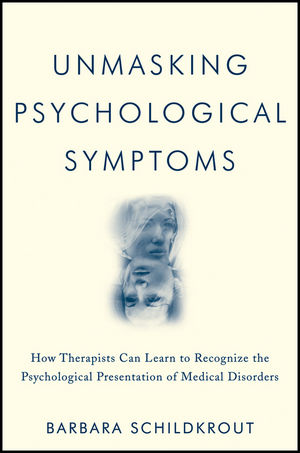Unmasking Psychological Symptoms: How Therapists Can Learn to Recognize the Psychological Presentation of Medical DisordersISBN: 978-0-470-63907-8
Paperback
304 pages
August 2011
 |
||||||
"Unmasking Psychological Symptoms: How Therapists Can Learn to
Recognize the Psychological Presentation of Medical Disorders
is designed to help therapists bridge the gaps in their expertise
between psychology and medicine so as to prepare them to better
understand their patients and have a higher index of suspicion
about medical factors that may affect them. The tone and scope
render Unmasking Psychological Symptoms an ideal read for
therapists.... Schildkrout does an excellent job throughout the
book of initially presenting information in the psychological
manner that a therapist might typically consider it and then
elucidating what the same information may suggest from a medical
perspective. Her approach does not feel condescending to a
nonmedically trained therapist but rather offers a different
perspective that may simply result in a desire to be more
thoughtful in clinical practice... Unmasking Psychological
Symptoms makes an excellent companion to psychology and
psychiatry textbooks, especially those related to health psychology
and consultation–liaison psychiatry." (PsycCRITIQUES,
May 16, 2012, Vol. 57, Release 19, Article 8)
"In this practical and easy to read volume, Unmasking
Psychological Symptoms, Dr. Barbara Schildkout, an experienced
psychiatrist, offers both medical and non-medical psychotherapists
a much-needed overview of the complex interrelationship between
physical and psychological disorders. She shows how psychological
symptoms can easily mask underlying medical illness and mislead
even those of us with the best training and intentions. She
underscores the need to be vigilant in our clinical formulations,
always on alert for signs and symptoms of medical disorders. One of
the strengths of this volume is the author's use of abundant
clinical vignettes to illustrate her points. She uses these cases
to take the reader through important lines of inquiry that are
essential for clinicians. Reading this volume will help us not be
seduced by our psychological theories and lead us down the
dangerous path of ignoring the contribution of underlying medical
illness. I can wholeheartedly recommend this excellent volume to
all who practice psychotherapy whether a student, early career
professional, or experienced clinician."
—Jeffrey J. Magnavita, Ph.D., ABPP; Diplomate in Clinical Psychology, American Board of Professional Psychology; Past President, Division of Psychotherapy, American Psychological Association; Member of the APA Clinical Treatment Guidelines Advisory Committee
—Jeffrey J. Magnavita, Ph.D., ABPP; Diplomate in Clinical Psychology, American Board of Professional Psychology; Past President, Division of Psychotherapy, American Psychological Association; Member of the APA Clinical Treatment Guidelines Advisory Committee



